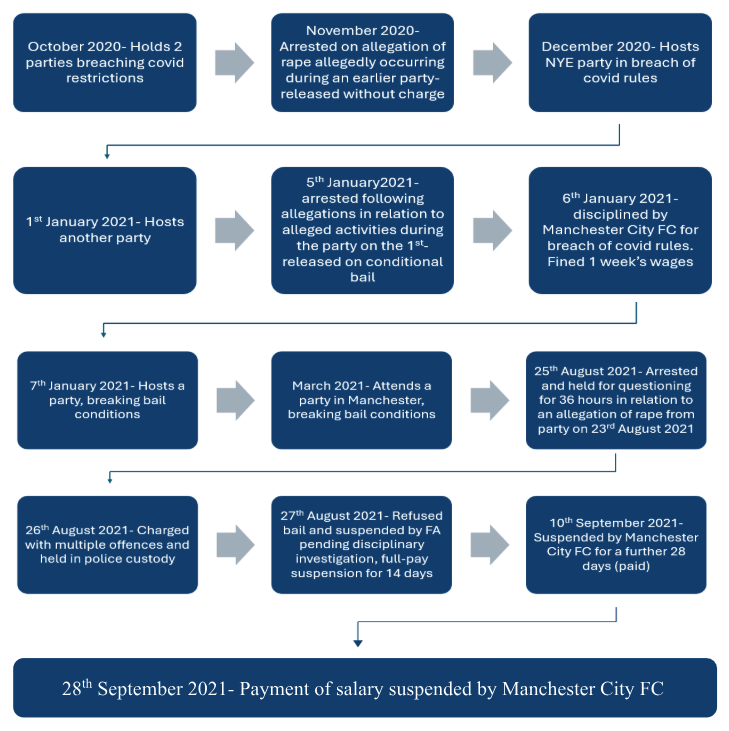Former Manchester City footballer Benjamin Mendy has successfully secured the majority of his £11 million employment tribunal claim against the club, following the withholding of his wages for nearly two years.
Benjamin Mendy, who earned £500,000 per month, had his salary suspended in September 2021 while facing criminal charges for rape and sexual assault. Although he was ultimately acquitted of all charges, Sean Jones KC, representing Manchester City, argued before the tribunal that the suspension of Mendy’s wages was a consequence of his own misconduct.
The events leading to the suspension of pay are detailed below:

The Issues
The central issue in the case was whether the deductions to Mendy’s wages were lawful under Section 13 of the Employment Rights Act 1996.
Sean Jones KC contended that Mendy had only himself to blame for his wages being withheld, asserting that his repeated breaches of COVID-19 restrictions and bail conditions directly resulted in his inability to fulfil his professional duties.
Despite the assertions of the club, Mendy’s inability to work was actually impacted by more than just his lifestyle choices. Tribunal Judge Joanne Dunlop made the distinction between avoidable and unavoidable impediments that prevented Mendy from working.
Avoidable vs Unavoidable Impediments:
Being remanded in custody was recognised as an avoidable impediment- something that Mendy could have avoided by making appropriate lifestyle changes. Whereas the FA suspension that prevented Mendy from working, was recognised as an unavoidable impediment, as it was not a punitive measure in response to Mendy’s behaviour, but rather a precautionary measure enforced by the FA.
Therefore, for the time that Mendy was in custody, Manchester City were entitled to withhold his wages. It was his breach of bail conditions that meant he was unable to fulfil his contractual duty to the club, and so he was not entitled to be paid.
However, the club were not entitled to withhold Mendy’s pay for the periods he was not in custody. Mendy himself was found to be ready, willing and able to work- only prevented from doing so by the FA suspension enforced on 27th August 2021. He was therefore entitled to receive his normal salary for this period.
The tribunal also found that there were no express or implied terms in Mendy’s contract that permitted the club to withhold his wages under such circumstances. Based on these findings, the tribunal concluded that Manchester City FC was not justified in withholding Mendy’s wages for periods when he was not in custody. As a result, the club were ordered to reimburse Mendy for the wages that were unlawfully withheld from him (to the value of around £8.5 million).
What Employers Can Learn
One clear takeaway for employers following the Benjamin Mendy case is that suspension should always be approached with caution.
According to the ACAS Code of Practice on Disciplinary and Grievance Procedures, suspended employees should continue to receive their pay as well as any other benefits in their contract.
Employees may be suspended without pay if there are provisions for this in the employment contract. However, employers that choose to suspend without pay must be acting reasonably. If a suspended employee believes they are unlawfully being suspended without pay, they bring a claim for unlawful deduction of wages to the employment tribunal, meaning that suspension without pay always has associated risks.
Suspending an employee without pay is therefore uncommon and generally reserved for cases with exceptional circumstances. Even when the terms of the employment contract provide for suspension without pay, employers who do so risk breaching the implied term of trust and confidence, potentially leading to employment tribunal claims.
Although most employees will not be entitled to claim for £11 million as in Mendy’s case, legal proceedings can be costly and time-consuming and are therefore best avoided!
Our Top Tips for Employers
- Consider alternatives to suspension- suspension should be approached with caution and only used as a last resort.
- Document your Decisions- keeping a record of your decisions relating to a suspension can help to show your rationale for the decision at the tribunal
- Keep the Employee Informed- it is important to notify the employee of their suspension in a clear and sensitive manner. The suspension should only last as long as is absolutely necessary, it is therefore important to review the suspension periodically and keep the employee informed of the next steps.
Feeling Unsure
If you are considering suspending an employee but feeling unsure about your options, contact the experts at Bhayani Law. Our dedicated team are able to offer advice regarding disciplinary procedures and suspensions, helping you to make decisions in the best interest of your business.
Reach out to Bhayani Law on 0333 888 1360, email hello@bhayanilaw.co.uk or complete a consultation form on our website at www.bhayanilaw.co.uk.







